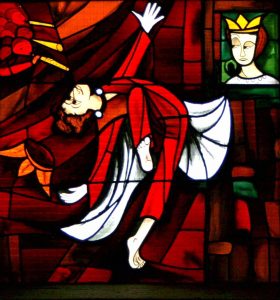Ord Om ordet
Feria iii, uke ii (2)
Engelsk tekst:
1 Samuel 16:1-13: God does not see as man sees.
Mark 2:23-28: The Son of Man is master of the sabbath.
We have just heard the Lord’s words to Samuel, ‘How long will you go on mourning over Saul when I have rejected him as king of Israel?’ The statement raises important questions. Can the Lord, then, choose someone, then subsequently reject him or her? Isn’t there just one salvific design, but also a plan B, potentially even C and D?
What we are up against is the interplay between God’s providence and our freedom, an abiding conundrum for us all, with concrete implications for our lives.
God, who has ‘no love for half-hearted men’ (Ps 119:113), had bestowed his vocation on Saul entirely, pledging the grace required for that vocation’s fulfilment. This gift, however, was premised on Saul’s response of fidelity. There is always a covenantal dimension to God’s call. It builds on bilateral loyalty, his and ours.
Saul failed in this respect. It wasn’t that he committed egregious sins. Quite simply, he had more confidence in his own opinion than in the Lord’s instruction. His intention was fair. He wished to do the right thing. But so attached was he to his notion of rightness, that he assumed his preference must also be the Lord’s. Well, it wasn’t.
This temperamental trait, embodied by Saul, is one we all carry to a greater or lesser degree. St Benedict warns about it right at the beginning of the Rule, calling our attention to the self-delusion of the Sarabites: ‘whatever they think and choose they say is holy and whatever they dislike they esteem unlawful’ (RB, I).
I dare say we’ve all had days when we’ve fallen into that old trap. There’s no thriving to be found in it.
When God rejected Saul, it was because Saul had already rejected him. The Lord accepted that rejection. Such is his reverence for our freedom that he honours even our destructive choices. That is one of the great mysteries of faith.
For decades there were people who failed to accept that things had moved on, die-hard loyalists to the Saulide line. They’re among the most unattractive characters of Scripture. Think of Michal, Saul’s daughter and David’s first wife, who despised her husband when she saw him dancing in abandon before the Lord’s Ark (2 Sam 6). She stands for all time as a symbol of barrenness, locked in self-centred fascination with her own dignity.
Then there’s that old rascal Shimei ‘of the house of Saul’. When David fled from Jerusalem during the rebellion of Absalom, Shimei ran after him shouting curses, pelting David and his retinue with stones (2 Sam 16). He stands for another pathetic paradigm: the perennially angry person who is always looking back, locked in a purely subjective reading of the past, despising others for not seeing history the way he does — even though history in fact looks quite different.
Through Samuel the Lord declares: ‘God does not see as man sees; man looks at appearances but the Lord looks at the heart.’ There’s no point trying to fool him. Let us then strive to be pure-hearted in attention to God’s will, whole-hearted in our obedience, warm-hearted in whatever service God entrusts to us, be it visible or hidden.

Michal and David in a stained-glass window in the Community Church of Barrington, IL.
If looks could kill!
